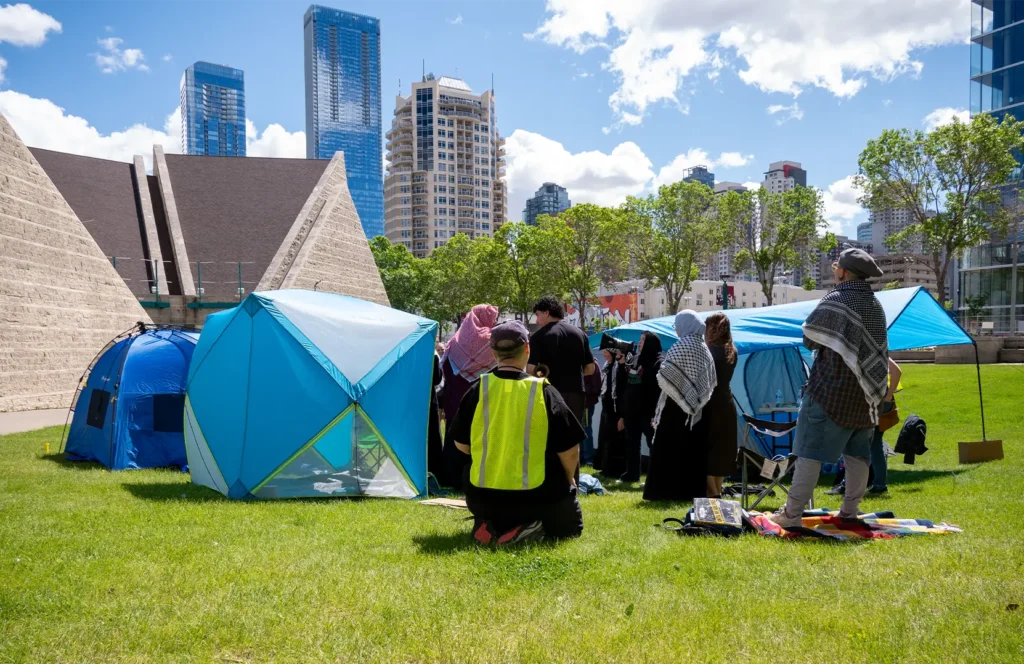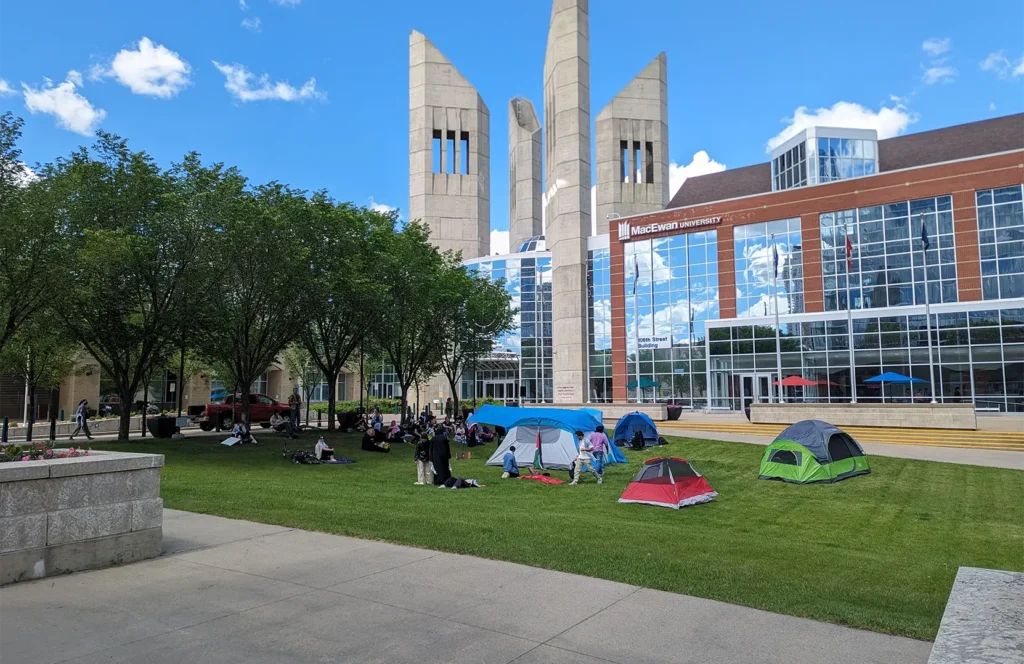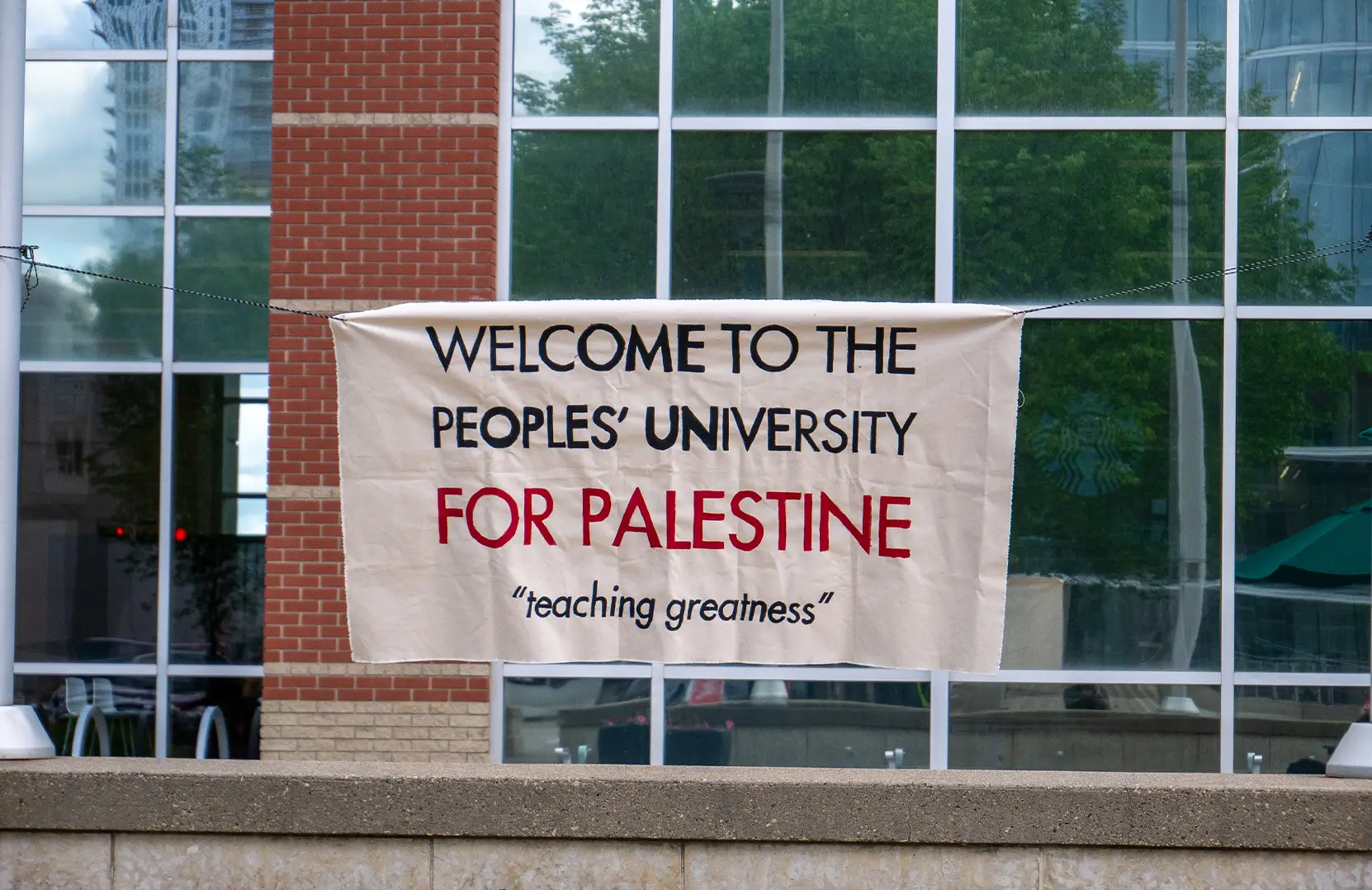Protestors make demands of MacEwan University to disclose and divest potential financial ties with Israel. July 13, 2024. THE GRIFF/Liam Newbigging.
Board of Governors meeting moved online; university president remains silent
Disclosure: Nour Salhi has previously contributed to the Griff. Salhi had no part in this article’s writing, editing, or shaping.
A group of tented pro-Palestine protestors set up camp on MacEwan University’s front lawn last Thursday morning for a day-long sit-in, demanding action from the school’s top brass on the Israeli-Palestine conflict.
The group, made up of MacEwan students, University of Alberta faculty, members of Independent Jewish Voices and other community members, demanded that the university disclose and divest any potential financial ties to Israel and for the institution to recognize and declare a genocide in Gaza.
“We strongly encourage MacEwan to submit themselves on the right side of history,” said Nour Salhi, a MacEwan student and spokesperson for the People’s University for Palestine YEG, the group that organized the protest.
“We call ourselves trendsetters here at MacEwan. So we hope that we follow in that statement.”
Along with the temporary camp, protestors put up posters with their demands on the doors to room 7-218, where the MacEwan Board of Governors was to assemble for a regularly scheduled meeting that day. The posters were taken down in under ten minutes, and the meeting was held online, but the university has not issued a reason for the move.
In an email to the Griff, MacEwan said that the administration was aware of the protest, that security had been in dialogue with the protestors, and was prioritizing student safety.
“We are committed to protecting and supporting freedom of expression,” the email said. “Universities are places where diverse ideas are welcome and respectful dialogues about difficult subjects are encouraged.”
A similar email was sent to students and employees.

Tents not allowed, university rules
While it was only for the day, this marks the first time pro-Palestine protestors have set up camp at MacEwan’s downtown campus, something the university says isn’t allowed, even if people aren’t staying the night.
Campus security services asked protestors about any potential overnight camping, later letting the group know that unapproved tents and structures were against the school’s Facilities and Operations Management policy. The policy was also referenced in the email sent out to the campus community.
The policy, which has been in place since 2010, was recently updated on May 7 to include rules about tenting and temporary structures on campus.
At 3 p.m., security informed the protestors that they would return at 3:30 to remove their tents. Protestors said they were already planning to leave at 6 p.m. but would pack up the tents if they could meet with President Trimbee. Shortly after, security returned and told the protesters they could remain until 6 p.m. but that Trimbee had declined to meet. The group packed up and left before the cutoff.
The Griff requested an interview or comment from MacEwan to verify details regarding interactions between security services and the protestors, which MacEwan declined.
Season of protest
These actions are the latest in a series of demonstrations with similar demands that have targeted post-secondary institutions nationwide since April.
The People’s University for Palestine YEG group had attempted a permanent encampment at the University of Alberta in May, which lasted two nights before police cleared the structures, using batons and chemical irritants on people who refused to leave.
While administrations from the U of A and MacEwan have not met with protestors, other institutions such as McGill University, the University of Ottawa and the University of Toronto have been in talks with protestors for several weeks.
Salhi says that no university president in Alberta has agreed yet to meet with student protestors on this issue.
“They want to placate us. Let us shout a bit and then hope that we just go home,” Salhi said when asked about the university’s responses. “The issue is we’re nine months into a genocide; shouting and then going home is not enough.”

Conversations with SAMU
SAMU has been asking for there to be a peaceful dialogue between the university administration and student protestors since May 14, when it addressed the police’s use of force in clearing the U of A encampment.
“We believe that any breach of policy does not constitute violence against our students,” SAMU President Gabriel Ambutong says.
While there haven’t been any meetings between protestors and MacEwan, SAMU has met with the MacEwan Palestinian Student Alliance, whose members have been active in protests like the one on Thursday.
Abraar Alsilwadi, the President of the Palestinian Student Alliance and spokesperson for the People’s University for Palestine YEG, says SAMU didn’t initially respond to the group’s emails, which began in October. However, months later, after the group had come to talk in person, SAMU agreed to meet and would meet with them two more times.
Ambutong says it took time to put together an advocacy plan.
“We have to have the data to support our advocacy,” Ambutong says. “We sent out the Global Conflict Survey in response to the number of emails that we’re getting in order to make sure that we had an informed database to be able to advocate effectively for student needs.”
Alsilwadi and Salhi agree they were pleasantly surprised by SAMU’s May 14 statement and believe the association is moving in the right direction.
Since getting the data back from the survey, SAMU has pushed the university to provide more support for students struggling with global conflicts. In March, exam deferral fees were temporarily waived in some specific instances.
“Even though what they offered us at the third meeting was a little underwhelming and very long overdue, we do acknowledge the efforts that they put in,” says Alsilwadi.
Global conflict; grief on campus
Alsilwadi has had family and friends affected directly by the conflict in Gaza and says the lack of support and acknowledgement from the university has made schooling difficult.
“Mid-shift [while I was working] at the [MacEwan] Makerspace, My friend who is on Students’ Council, who is originally from Gaza, came up to me on several instances where she would tell me about a family member that was just killed in the morning that day, and we would just cry together in school.”
Alsilwadi dropped out of full-time classes in the winter semester and isn’t attending classes in the spring as a direct result.
“I feel like I lack focus. I can’t focus on my classes. I can’t focus at work. Every day is filled with grief,” Alsilwadi says.
The Griff contacted MacEwan for further comment regarding the Facilities and Operations Policy but has not yet received a response.
Clarification June 19 12:13 pm: This article originally stated that exam deferral fees were temporarily waived. It has been clarified to say that in some specific instances the fees were waived, but it was not a blanket change.





Hey people!!!!!
Good mood and good luck to everyone!!!!!
This article on protestors setting up tents for a sit-in at MacEwan last Thursday highlights the power of peaceful student activism and collective voice in shaping campus policy. It’s encouraging to see members of the community come together to stand up for their beliefs and spark important conversations. For those researching post-secondary options and costs, you may also find valuable insights at Telkom University Jakarta.